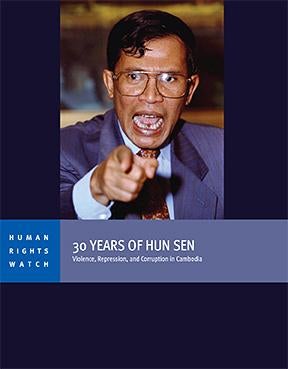 |
Activist Tep Vanny takes part in a land rights protest in Phnom Penh, Cambodia on November 7, 2012. Reuters
|
Cambodia: Drop Case Against Peaceful Activists
Donors Should Urge End of Politically Motivated Prosecutions
 | 19 August 2016
| 19 August 2016
(New York) – Cambodian authorities should immediately drop the prosecution of two social activists for “direct incitement” to foment social disorder, Human Rights Watch said today. The prosecution violates their rights to freedom of expression and peaceful assembly.
On the evening of August 15, 2016, in Phnom Penh, police took two women, Tep Vanny and Bov Sophea, into custody while they were staging a symbolic cursing of people they consider responsible for human rights violations in Cambodia. Their arrests took place during a so-called Black Monday gathering where demonstrators were calling for the release of previously jailed human rights defenders, and for an independent investigation into the July 10 killing of Kem Ley, a popular social commentator and frequent government critic. The detention and subsequent charging of the two women is the latest effort by Phnom Penh authorities to deter and suppress weekly peaceful protests against Prime Minister Hun Sen and his ruling Cambodian People’s Party (CPP).
“The baseless charges against two activists is the latest escalation of the government’s increasingly vindictive assault on peaceful critics,” said Brad Adams, Asia director. “In Kafkaesque Cambodia, it seems one can’t protest the wrongful treatment of critics of the government without becoming the next target of government mistreatment.”
The baseless charges against two activists is the latest escalation of the government’s increasingly vindictive assault on peaceful critics.
Brad Adams
Asia Director
Since May, as part of the government’s anti-Black Monday repression, the Phnom Penh police and para-police have repeatedly taken peaceful protesters into temporary custody, threatening them with prosecution unless they cease their activities. In many instances, detained protesters were compelled to sign “contracts” promising to stop. Such documents have no basis in Cambodian law and violate international legal guarantees of freedom of expression and peaceful assembly. This has been accompanied by a campaign of directly and indirectly threatening telephone calls and visits by security force officers to prominent social activists that appear aimed to end to their activities. Such intimidation has occurred both before and after the outburst of largely spontaneous mass mourning for Kem Ley, who had received warnings before he was assassinated.
The detention and charging of Tep Vanny and Bov Sophea marks the first time the authorities have gone beyond temporary holding of Black Monday protesters. After being kept in police custody without charge for the maximum period of 48 hours, a prosecutor of the Phnom Penh Capital Court on August 17 invoked article 47 of Cambodia’s criminal procedure code to charge the two women for immediate and summary trial for allegedly violating criminal code article 495, which provides six months to two years’ imprisonment for “direct incitement to commit a felony or to commit acts generating severe disruption to the security of society.” Invoking the “immediate appearance” procedure under article 47 allowed prosecutors to bring Tep Vanny and Bov Sophea before a trial judge on August 17, circumventing the normal criminal procedure by which the accused and their defense counsel can contest the evidence against them during investigations by the prosecution and an investigating judge.
The case’s trial judge has set hearings for August 22, 2016, giving the two women, to whom he also denied bail, virtually no time to prepare their defense, in violation of their fair trial rights under Cambodian law and the International Covenant on Civil and Political Rights (ICCPR). Beyond the women’s apparent arrest for peacefully exercising their fundamental human rights, criminal code article 495 requires that the prosecution show that the defendants’ “direct incitement” resulted in an intentionally immediate and specific threat of “severe disruption to the security of society,” of which there is no evidence. In addition, applying procedure code article 47 to this case appears legally flawed, as it requires that the offense to be tried carry a punishment of at least one year in prison, more than the six months’ minimum specified for incitement under article 495.
“How many peaceful protesters need to be arrested before Cambodia’s international donors express outrage?” Adams said. “They should jointly and publicly call for the release of Tep Vanny and Bov Sophea and an end to the government’s campaign against peaceful protest.”



A good Hun Sen is a deposed Hun Sen.
ReplyDelete